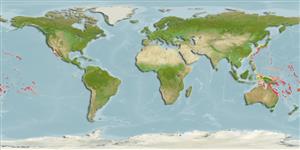Teleostei (teleosts) >
Centrarchiformes (Basses) >
Kyphosidae (Sea chubs)
Etymology: Kyphosus: Greek, kyphos = bent (Ref. 45335); pacificus: Named for its distribution in the Pacific Ocean.
Issue
Kyphosus sandwicensis (Sauvage, ) has been considered as an older name for this species, at least for the Hawaiian population (Ref. 54980). Further study of the genus may show that the name Kyphosus sandwicensis will replace the name Kyphosus pacificus elsewhere in the central and western Pacific (Ref. 86689).
Environment: milieu / climate zone / depth range / distribution range
Ecology
Marine; reef-associated; depth range ? - 20 m (Ref. 86942). Subtropical
Western Central Pacific.
Size / Weight / Age
Maturity: Lm ? range ? - ? cm
Max length : 75.0 cm TL male/unsexed; (Ref. 89972)
Short description
Identification keys | Morphology | Morphometrics
Diagnosis: Mouth terminal with anterior tip of upper jaw pointed. Anterior part of anal-fin soft-rayed portion well elevated in specimens greater than approximately 20 cm SL; with longest anal-fin soft ray (second) longer than longest dorsal-fin spine (sixth). Pectoral fin long, pointed posteriorly with 18-20 (mode 19) soft rays. Pelvic fin not reaching anus when depressed. Gill rakers 26-29 (mode 27) (Ref. 55727).
Occurs inshore (Ref. 75154).
Life cycle and mating behavior
Maturity | Reproduction | Spawning | Eggs | Fecundity | Larvae
Sakai, K. and T. Nakabo, 2004. Two new species of Kyphosus (Kyphosidae) and a taxonomic review of Kyphosus bigibbus Lacepède from the Indo-Pacific. Ichthyol. Res. 51:20-32. (Ref. 55727)
IUCN Red List Status (Ref. 130435: Version 2024-1)
Threat to humans
Harmless
Human uses
Tools
Special reports
Download XML
Internet sources
Estimates based on models
Preferred temperature (Ref.
123201): 23.3 - 29.3, mean 28 °C (based on 1406 cells).
Phylogenetic diversity index (Ref.
82804): PD
50 = 0.5000 [Uniqueness, from 0.5 = low to 2.0 = high].
Bayesian length-weight: a=0.01778 (0.00765 - 0.04135), b=3.01 (2.81 - 3.21), in cm total length, based on LWR estimates for this (Sub)family-body shape (Ref.
93245).
Resilience (Ref.
120179): Low, minimum population doubling time 4.5 - 14 years (Preliminary K or Fecundity.).
Fishing Vulnerability (Ref.
59153): Moderate to high vulnerability (50 of 100).
Nutrients (Ref.
124155): Calcium = 23 [10, 39] mg/100g; Iron = 0.514 [0.281, 0.934] mg/100g; Protein = 18.9 [17.6, 20.3] %; Omega3 = 0.108 [0.057, 0.210] g/100g; Selenium = 17.4 [7.2, 40.8] μg/100g; VitaminA = 19.6 [3.8, 93.0] μg/100g; Zinc = 0.835 [0.528, 1.361] mg/100g (wet weight);
